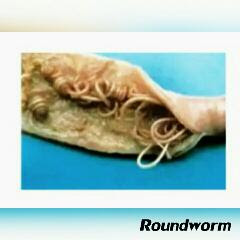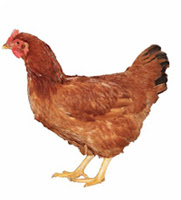Poultry Worms: Types, Symptoms And Treatment
Poultry worms are endoparasites of different forms that negatively affect the poultry gut and respiratory system. In any kind of poultry, worms will impair the health of the bird to a degree because they are taking the nutrients out of the food of their hosts which will lead to weight loss in your birds, or they may not be growing at the rate they should be. Worms can damage the digestive tract of the birds which can lead to other infections. There will be a drop in egg production and the birds may seem unhealthy and listless. Discussing the life cycle of worms may seem unnecessary but it is one of the most common ailments for poultry. Hence, it is very significant to know the symptoms, treatment and preventive measures you can take to protect your birds.
There are a number of different kinds of worms. Here are some common ones that are known to affect poultry animals:
1. Roundworm: Hair worm, Thread worm
Hair worm and thread worm are classes of roundworm which can be found in the oesophagus, intestine, stomach, and the crop of poultry animals. Roundworms look like spaghetti and normally follow a direct life cycle when an infected birds releases worm eggs in its dropping and another bird can pick up the eggs; or they can be picked up by a carrier like an earthworm. They have a 28 day life cycle. They can also infect the oviduct and be passed out inside the eggs. At maturity they are 3 inches long and can be seen in the dropping if expelled by the bird.
2. Gape worm
Gape worm affects the trachea and lungs as it is attached to the trachea (windpipe) of chickens where it impairs breathing resulting in the birds gasping. Young birds are particularly susceptible and can become infected by sharing space with wild birds like pheasants. Gapeworm can be fatal if not treated. It usually exist through an intermediate host like earthworms, snails, slugs and once the larva is ingested by the bird, it has a life cycle of 14 days. It can also be picked up directly from another bird coughing up the worms onto the ground and then your birds picking it up when scratching the ground.
3. Gizzard worm
Gizzard Worm or Amidostomum Anserisare affects the gizzard, primarily an issue in geese. It is a thin worms about 2cm long that predominantly affect geese. Infestations occurs directly by birds eating eggs that have been passed out in droppings. So, they are most likely to occur when geese are kept on the same pasture. Gizzard Worm is probably the most common form of problem in young geese as older geese build up a resistance. Gizzard worm can cause serious damage to geese and is the most common form of death in goslings.
4. Caecal worm
Caecal worm (Heterakis gallinarum) is a type of endoparasite that infest the ceca, particularly potent to turkeys and thrives well on the ground or litter of overcrowded bird enclosures. It has a direct life cycle as adult worms produce eggs while inside their host (the infected chicken), which it passes within its feces. The eggs remain in the soil or litter for several weeks or are ingested by another chicken. Once inside the chicken, the larvae hatch in the upper intestine and relocate to the ceca. Eggs are also ingested by earthworms, which are then consumed by the chicken, who becomes infected through the earthworm. The main effect of the cecal worm is that it serves as a main vector for the transmission of Histomonas meleagridis, a protozoan parasite known to cause blackhead disease.
5. Tapeworm
Tapeworms are less common and are segmented, ribbon-like worms. They attach themselves to the wall of the intestine by burying their heads in the lining of the intestine. Their eggs are carried by slugs and snails so free-ranging birds are more susceptible than indoor birds. Heavy infestation can reduce the bird's ability to fight other infections. Reproduction is from segments of the worm that break off and are passed through the chicken in its droppings where it contaminates the ground for other birds to pick up. They are very hard to see with the naked eye and have a life cycle of 6 weeks.
Symptoms Of Worms
Check the droppings worths making a regular routine, even if it seems unpleasant to look at your chicken's droppings. Healthy chicken droppings should be fairly firm and rounded with two distinct sections. The largest darker portion should be black, brown and/or grey in colour and the smaller portion should be white (urine) and it will form a cap at one end.
As with all advice we give, it is not a precise diagnosis so if you are at all concerned, you should consult a vet who can arrange a worm count of the droppings.
Move that if the droppings are:
◆Green coloured - this could be a dietary imbalance caused by too much green matter or too much protein, or can also be indicative of a more serious internal infection. Veterinary diagnosis is recommended if you have reduced the green in their diet but it makes no difference.
◆Yellow coloured - loose yellow droppings which will normally stick to the feathers of the birds bottom are most often a sign of internal worms. It can also be that the birds have a diet rich in corn or maize but in our experience it is usually worms. It could also point to a respiratory infection but there would be other signs with this kind of problem.
This is not to be confused with Caecal droppings which are brown and foamy and expelled roughly every 7-10 droppings which is perfectly normal.
◆Black, runny and sticky - Can point to nutritional deficiency. Revisit their diet and feed only layers pellets ad lib with treats of corn twice a day for two weeks to see if this improves their droppings. Stop all other treats for this period.
Other signs are sighting worms in the droppings, dirty vent, dishevelling , depression, weight loss, drop in egg production and pale comb.
How do chickens get worms?
Generally, worms are transmitted through droppings, as they live in the droppings of an infected bird. These worms will stay on the ground until they are picked up by another chicken that is foraging around for food. The types of worms that are commonly transmitted in this way are roundworms, gizzard worms, hair worms and caecal worms. The birds can also pick up worms indirectly through eating earthy animals like earthworms, snails and slugs. This happens because the earthy animals have eaten the worms excreted by another infected bird. Hair worms, gape worms and tapeworms can be transmitted through this cycle.
Prevention of Worms
These simple preventive measures against worm infestations can help save a great deal and loss of birds.
** Give them clean ground regularly. Never allow them to stay on bare earth for long periods, the ground will become 'fowl sick' and harbour countless worm larvae, bacteria and potential infections.
** If in a fixed run then move it regularly to new ground, or if you are not able to move the run then consider a surface that can be cleaned with disinfectant (not concrete please, it's not a natural surface at all). Using a loose Hardwood Woodchip surface for example, then make a watering can mix with Bi-OO-Cyst Coccidial Disinfectant, to regularly wet the ground is a good solution (do not use on grass or near watercourses). Then, use disinfectant regularly inside the hen house too as contaminants can be carried inside.
** Use Apple Cider Vinegar in your birds drinking water regularly (plastic drinkers only). This changes the balance of acid in their gut so that it becomes a rather inhabitable for worms to live and breed. One teaspoon per litre of water is all that is needed.
** Diatomaceous Earth Powder can also be used to mix with their feed at a rate of 5% to feed. To be effective though Diatomaceous Earth Powder should be used all the time.
** Keep grass relatively short as sunlight destroys worm eggs.
** If your birds free-range and come into contact with wild birds, like pheasants and rooks for example, as well as having regular treats of slugs, earthworms and snails, then more vigilance is needed. The herbal answer is Verm-X Pellets for Poultry, Herbal Gut Conditioner or Battles Easyverm Pellets every month, or the chemical answer is Flubenvet twice a year.
Treatment of worms
There are different methods of treating worms. Farmers can apply Chemical (chicken wormer) or Herbal Procedure, the use of chicken wormers is chemical while the use of herbs or natural recipes is herbal.
a. Chicken Wormers
You can buy specially made chicken wormers from any major pet stores or online. It generally comes in liquid, tablet or syrup form, and should be added to your chickens water once every three months. You can generally administer orally as well, but might be easier just popping it into the water. How much you add will depend on your flock size, but there should be guidelines on the box. The wormers generally cater for the prevention of all types of worms, rather than just one specific type.
b. Herbal or Natural Remedies are as follow:
#1. Diatomaceous earth is often added into chickens feet because it acts as a natural dewormer. It works by dehydrating the parasites and worms that exist internally. In terms of its effectiveness, the jury still seems to be out on whether it will definitely kill all parasites, however, feeding your chickens diatomaceous earth is actually of great beneficial effects.
#2. Apple Cider Vinegar is a marvellous thing to feed your chickens, it has many great health benefits as its packed with vitamins and minerals, so you should be adding it to your chicken’s water anyway. In terms of its worming capabilities, Apple Cider Vinegar acts as a mild antiseptic and also a mild antibiotic, so it will kill some bacteria and germs, and deter worms from making a home in your chickens. Again, it’s not a 100% guaranteed treatment, but still beneficial to feed to your chickens.
#3. Garlic is another natural food substance that is known to help keep worms at bay, and makes your chicken’s internals a less attractive place for parasites to settle. Adding some ground up garlic into your chicken’s feed is a great way to get your chickens to eat it, and you can also pop some slightly crushed cloves into their water. Again, garlic is just great to give to your chickens regardless, as it helps their respiratory system and boosts their immune system. In terms of what the most effective methods for worming your chickens is, your safest bet is to go with a proper poultry wormer and apply that every three months as a preventive measure as you’d do with any other pet. It got much better to stop worms than cure them.
In conclusion, it is important to get rid of, or prevent, internal worms to have healthy hens, and farmers should look out for any of the symptoms of worm infection to take the necessary steps with immediate effect. Best wishes!
For quick updates and comments, follow us on our social media connects; FacebookPage, TwitterHandle and Instagram. You can also subscribe and watch videos on our YouTube channel. At Artib Farm, we materialize your satisfaction!








Comments
Post a Comment